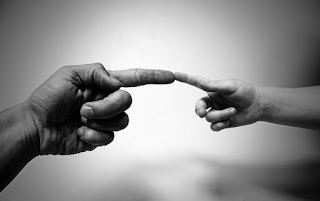RECOVERY FROM TRAUMATIC ABUSE: IT'S TIME TO COME OUT OF THE SHADOWS OF SHAME
Let's face it - recovering from traumatic abuse is tough. There's no two ways about it. But recovery should not be an isolating experience. Does your shame about what was done to you drive you into the shadows?
It's time for a new model of recovery from traumatic abuse. It's time for survivors to heal OUT LOUD AND PROUD. How can you start to do it? By claiming the wonder that is you as a survivor. So take a seat, Beloved and lemme tell you the tale of YOU.
Holding onto the shame creates collateral or secondary trauma for the survivor. Self hatred, isolating, self harm, depression, and impaired relationships are just a few of the damaging side effects of carrying the burden of shame. Even the most taboo, most horrific abuse does not in any way belong to the victim; the shame is solely the perpetrator's.
Probably things like "It wasn't your fault", "It's terrible that she did that to you", "You didn't deserve to be hurt like that", "he shouldn't have betrayed you like that", "It's not right for anyone to say such mean things to you" are a few examples of what you'd probably say. You would have no qualms about reminding him that he was not to blame for the abuse. The trick is - to give yourself that same reprieve, and that same kindness.
Try talking to yourself gently, and compassionately, either out loud, or through journaling - or both! If you have a trusted friend that you can share your recovery with, ask him or her to mirror back those comforting phrases to you. This will start you down the path of letting go of the shame.
You could try using a mantra that you start and end each day with - for example
"I'm proud of myself for having survived, and now is my time to heal and thrive."
Start surrounding yourself with people who understand and support your recovery.
So what kind of people are you looking for?
You're looking for people who are compassionate. They care for you and understand what you're going through. They don't feel the need to "fix" you or give you solutions to all your problems. They are willing to sit with you when you're having a hard time and to just be a compassionate witness. They understand how to make space for you and your suffering.
What does that mean? It means they can be present, listen to you express your pain, witness your pain and suffering, and be supportive and compassionate in the moment of suffering by saying things like "I hear you", "You're not alone, I'm here with you", "You will get through this" and so on.
You may be blessed to already have such people in your life. If you don't, start keeping these characteristics in mind as you choose who you share your journey with.
It's really important to stop exposing your tender under-belly of suffering to mean, judgmental people.
Join support groups that focus on issues you may have. For a comprehensive list of support groups, visit the Thrive Trauma Recovery Coaching Facebook page (link below). Try out some support groups until you find ones that fit.
But here's the trick - do more than just show up. Get involved in service to the group. That's the best way to really connect with fellow members - and it will help you make friends with people who will support you in your recovery.
And the best part - your tribe will help you celebrate your successes in recovery, and there's no better feeling in the world. You can recover, Beloved, out LOUD AND PROUD! You can THRIVE.
Stephanie Shipp B.A., J.D., C.T.R.C.
www.thrivetraumarecoverycoaching.com
Follow THRIVE on Facebook and Instagram:
https://www.instagram.com/thrivetraumarecoverycoaching/
https://www.facebook.com/THRIVEtraumarecoverycoach/
Or drop me an email anytime: stephanie@thrivetraumarecoverycoaching.com
It's time for a new model of recovery from traumatic abuse. It's time for survivors to heal OUT LOUD AND PROUD. How can you start to do it? By claiming the wonder that is you as a survivor. So take a seat, Beloved and lemme tell you the tale of YOU.
Put The Shame Where It Belongs
Someone did something to you. Something painful, something terrible, something shameful. But the shameful part doesn't belong to you. It belongs to the shameless, creepy person that abused you. As survivors we MUST stop carrying the shame of our perpetrators. We can't heal completely without doing so. Many coaches insist that you can't even START the healing journey in earnest until you let go of the shame.Holding onto the shame creates collateral or secondary trauma for the survivor. Self hatred, isolating, self harm, depression, and impaired relationships are just a few of the damaging side effects of carrying the burden of shame. Even the most taboo, most horrific abuse does not in any way belong to the victim; the shame is solely the perpetrator's.
Get On the Self-Compassion Band-Wagon!
How can you stop feeling shame about your abuse? Self-compassion is the first step. Talk to yourself, change your internal dialogue about your abuse. Look at your abuse from the outside - imagine what kind of comfort you would give to an abuse victim. What would you say to your best friend about the traumatic abuse he had suffered?Probably things like "It wasn't your fault", "It's terrible that she did that to you", "You didn't deserve to be hurt like that", "he shouldn't have betrayed you like that", "It's not right for anyone to say such mean things to you" are a few examples of what you'd probably say. You would have no qualms about reminding him that he was not to blame for the abuse. The trick is - to give yourself that same reprieve, and that same kindness.
Try talking to yourself gently, and compassionately, either out loud, or through journaling - or both! If you have a trusted friend that you can share your recovery with, ask him or her to mirror back those comforting phrases to you. This will start you down the path of letting go of the shame.
Take Pride in Surviving
Let's really OWN what it means to be a survivor.
First the sad truth: many people do not survive traumatic abuse. Many destroy themselves by means of addiction, self harm, risky, dangerous behavior, and suicide.
So don't assume that you're nothing special for having survived. The exact opposite is true - you are a marvel for having survived the traumatic abuse. The fact that you survived means that your brain found a way to help you cope with a situation that would drive others over the edge. Love your brain for helping you do that. Love your mind for finding creative ways to make it through and out the other side. There is no shame in surviving. I know sometimes it doesn't feel that way, but it's true.
Think of it this way: if you sent me off to slay a huge dragon with a just a sword and shield, and I did manage to slay him but returned with some cuts and bruises, would you ridicule me for my wounds? Would you say "yeah ok you killed the dragon but look at your legs and all those cuts - that's terrible cover that up! how disgusting!"
Hell no! You would say "Wow you did it! You rock!" and then you would gently treat my wounds with loving care and kindness.
Well, Beloved, you are that dragon slayer. You survived the unspeakable . . . . abuse by vicious narcissists, childhood sexual abuse, incest, domestic violence, combat, bullying, sexual assault. . . . you survived situations that would drive others over the edge. Rejoice! Don't fault yourself because of what amounts to cuts and scrapes in the aftermath. Don't shame yourself for your triggers, for your panic attacks or anxiety or complex PTSD. Don't hate yourself for your depression or insomnia. Those are your cuts and scrapes from the battle. You've got your battle wounds. They need healing. But you can't heal them by blaming yourself for them. That's ground zero of healing from traumatic abuse. Let the self-blame and self-hatred go. Be proud of yourself for surviving!You could try using a mantra that you start and end each day with - for example
"I'm proud of myself for having survived, and now is my time to heal and thrive."
Build Your Recovery Tribe
Do you lack people in your life who understand and support your recovery and healing? It's so frustrating trying to explain what you're feeling to people who are tone-deaf about suffering and surviving abuse. Inevitably, such people tell you to "just get over it" and "move on", or worse - to "forgive and forget". Such platitudes sounds like GREAT advice, except if the dragon has yanked your arm nearly off, you need more than the bandaid of superficial advice.Start surrounding yourself with people who understand and support your recovery.
So what kind of people are you looking for?
You're looking for people who are compassionate. They care for you and understand what you're going through. They don't feel the need to "fix" you or give you solutions to all your problems. They are willing to sit with you when you're having a hard time and to just be a compassionate witness. They understand how to make space for you and your suffering.
What does that mean? It means they can be present, listen to you express your pain, witness your pain and suffering, and be supportive and compassionate in the moment of suffering by saying things like "I hear you", "You're not alone, I'm here with you", "You will get through this" and so on.
You may be blessed to already have such people in your life. If you don't, start keeping these characteristics in mind as you choose who you share your journey with.
It's really important to stop exposing your tender under-belly of suffering to mean, judgmental people.
Join support groups that focus on issues you may have. For a comprehensive list of support groups, visit the Thrive Trauma Recovery Coaching Facebook page (link below). Try out some support groups until you find ones that fit.
But here's the trick - do more than just show up. Get involved in service to the group. That's the best way to really connect with fellow members - and it will help you make friends with people who will support you in your recovery.
And the best part - your tribe will help you celebrate your successes in recovery, and there's no better feeling in the world. You can recover, Beloved, out LOUD AND PROUD! You can THRIVE.
Stephanie Shipp B.A., J.D., C.T.R.C.
www.thrivetraumarecoverycoaching.com
Follow THRIVE on Facebook and Instagram:
https://www.instagram.com/thrivetraumarecoverycoaching/
https://www.facebook.com/THRIVEtraumarecoverycoach/
Or drop me an email anytime: stephanie@thrivetraumarecoverycoaching.com




Comments
Post a Comment